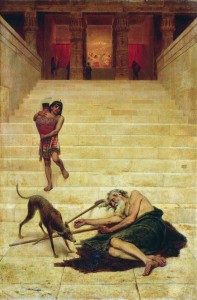Luke 16:19-31
This text is used for the Lectionary Year C on September 25th, 2016.

Kathleen Norris suggests that when someone asks you if you are a Christian, you should respond: “Here’s a list of my friends. Ask them.”
Would hungry children in poverty-stricken countries say that we are Christian ministers? Jesus’ Parable of the Rich Man and Lazarus challenges preachers to talk like followers of Christ.
Once there was a rich man whose friends call him Dives—which is Latin for rich. He enjoys looking through the Nieman-Marcus catalog. He wears handmade suits, custom-tailored shirts, and fancy underwear. The rich man is not a bad guy. He did not make his money as a hit man or a television preacher. He does not run Lazarus off his property or report him to the police. He does not do anything mean. He does not do anything. Maybe Dives noticed Lazarus and said a prayer for him, but he stuck to his policy of never giving anything directly to street people. Dives does not realize that his possessions are a gift to be shared, so Lazarus remains hungry.



